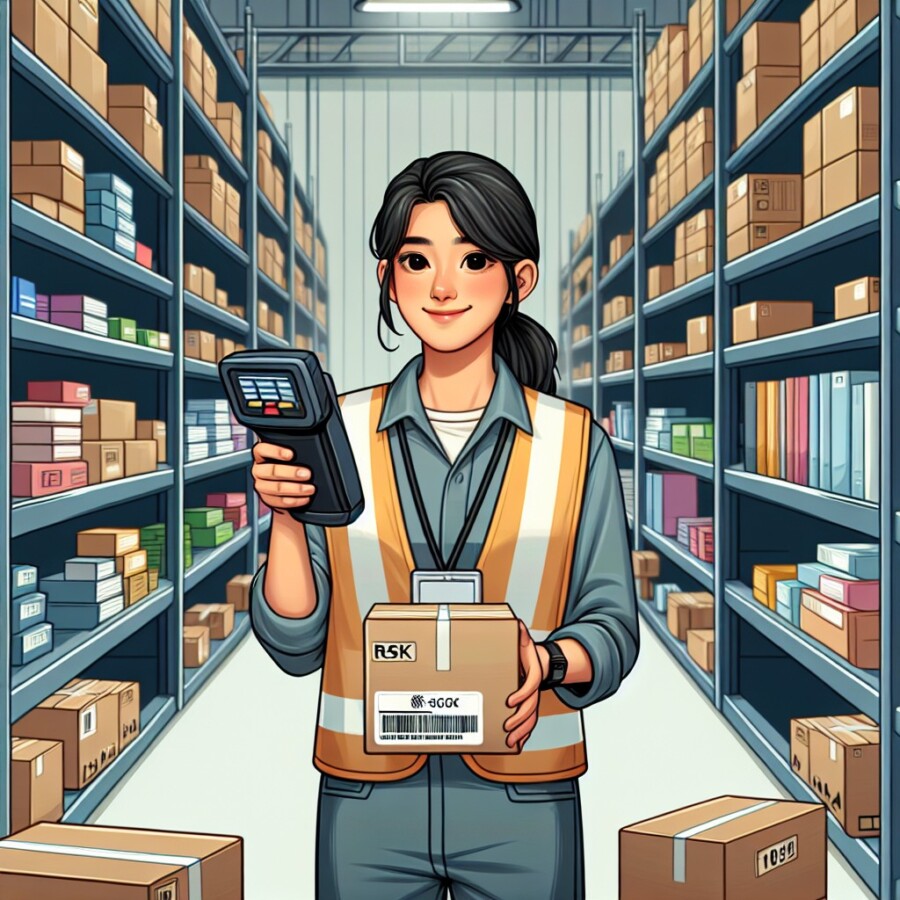Amazon has been fined €32m (£27m) in France for what the data watchdog deemed as “excessive” surveillance of its workers. The CNIL, France’s data protection agency, found that Amazon France Logistique, which manages warehouses, recorded data captured by workers’ handheld scanners in a manner that was illegal. The investigation was prompted by complaints from employees and media coverage of working conditions. The CNIL identified several breaches of the General Data Protection Regulation (GDPR), including the use of a system with three alerts to monitor employee activity, which was ruled to be illegal. Amazon has strongly disagreed with the findings and plans to appeal the decision.
The CNIL also questioned the need for Amazon to retain workers’ data for 31 days. The watchdog found that Amazon’s tracking of employee activity was so precise that it could potentially require workers to justify every break. The company used the data collected by the scanners to plan work, evaluate employees, and provide training. However, the CNIL ruled that Amazon did not require access to the smallest details of the data for these purposes. The watchdog also criticized Amazon for not properly informing workers and external visitors about surveillance and for having insufficient security on its video surveillance.
This is not the first time that Amazon’s surveillance practices have come under scrutiny. In the UK, a similar system for monitoring employee productivity was highlighted. Amazon’s Europe policy chief, Brian Palmer, stated that employees could be fired if they received three productivity flags on the system. However, Amazon later claimed that Palmer’s statement was not entirely accurate. A report by the Business, Energy and Industrial Strategy Committee raised concerns about the use of surveillance technology to set performance targets and monitor workers, stating that it could lead to distrust and micromanagement.
The GMB union, which represents Amazon’s UK warehouse workers, reacted to the ruling by stating that the company’s staff faced excessive scrutiny and surveillance. The fine imposed on Amazon by the CNIL highlights the importance of protecting workers’ privacy and ensuring that surveillance practices comply with data protection regulations. It also serves as a reminder to companies to be transparent and accountable in their use of surveillance technology.
Original news source: Amazon fined for ‘excessive’ surveillance of workers (BBC)
🎧 Listen:
Slow
Normal
Fast
📖 Vocabulary:
| 1 | surveillance | Close observation, especially of a suspected spy or criminal |
| 2 | excessive | More than is necessary, normal, or desirable; immoderate |
| 3 | watchdog | An organization or person that monitors and checks the actions of others to ensure fairness and compliance with rules and regulations |
| 4 | breaches | Acts of breaking or failing to observe laws or agreements |
| 5 | handheld | Designed to be held in the hand |
| 6 | illegal | Contrary to or forbidden by law |
| 7 | complaints | Statements expressing dissatisfaction or annoyance about a state of affairs or an event |
| 8 | precise | Marked by exactness and accuracy of expression or detail |
| 9 | justify | Show or prove to be right or reasonable |
| 10 | evaluate | Assess the nature or quality of something or someone |
| 11 | criticized | Expressed disapproval or disagreement |
| 12 | scrutiny | Critical observation or examination |
| 13 | productivity | The rate at which someone or something works or operates |
| 14 | micromanagement | Control or influence over someone’s actions in a detailed and often annoying way |
| 15 | transparent | Open to no doubt or misunderstanding; having clear communication |
Group or Classroom Activities
Warm-up Activities:
– News Summary
Instructions: In pairs or small groups, have students read the article and then summarize the main points in a paragraph or two. They should focus on capturing the key information and presenting it in a concise manner.
– Opinion Poll
Instructions: Divide the class into two groups: one group in favor of Amazon’s surveillance practices and one group against. Have each group prepare arguments to support their opinion. Then, conduct a class debate where students present their arguments and try to convince others to agree with their viewpoint.
– Vocabulary Pictionary
Instructions: Prepare a list of vocabulary words from the article, such as “surveillance,” “breaches,” and “data protection.” Divide the class into pairs or small groups and give each group a word. They must draw a picture that represents the meaning of the word and have their classmates guess what the word is. This activity helps reinforce vocabulary and comprehension skills.
– Pros and Cons
Instructions: In pairs or small groups, have students discuss the pros and cons of surveillance technology in the workplace. They should consider the benefits and drawbacks for both employees and employers. Afterwards, conduct a whole class discussion where groups share their thoughts and engage in a debate.
– Future Predictions
Instructions: After reading the article, have students imagine what the future of surveillance technology in the workplace might look like. In pairs or small groups, have them discuss and make predictions about potential advancements, ethical considerations, and impacts on workers’ rights. Then, have each group share their predictions with the class and discuss the possibilities.
🤔 Comprehension Questions:
1. What was Amazon fined for in France?
2. What prompted the investigation into Amazon’s surveillance practices?
3. What breaches of the General Data Protection Regulation (GDPR) did the CNIL identify?
4. How long did Amazon retain workers’ data for?
5. How precise was Amazon’s tracking of employee activity?
6. What were some of the purposes Amazon used the data collected by the scanners for?
7. What concerns did the Business, Energy and Industrial Strategy Committee raise about surveillance technology in the UK?
8. How did the GMB union react to the ruling?
Go to answers ⇩
🎧✍️ Listen and Fill in the Gaps:
Amazon has been fined €32m (£27m) in France for what the data watchdog deemed as “excessive” surveillance of its workers. The CNIL, France’s data protection agency, found that Amazon France Logistique, which manages warehouses, recorded data captured by workers’ handheld scanners in a (1)______ that was illegal. The investigation was (2)______ by complaints from (3)______s and (4)______ coverage of working conditions. The CNIL identified several breaches of the General Data Protection Regulation (GDPR), including the use of a system with three alerts to monitor employee activity, which was ruled to be illegal. Amazon has strongly disagreed with the findings and plans to appeal the decision.
The CNIL also questioned the need for Amazon to retain (5)______’ data for 31 days. The (6)______ found that Amazon’s tracking of employee (7)______ was so precise that it could potentially require workers to justify every break. The company used the data collected by the scanners to plan work, evaluate employees, and provide training. However, the CNIL ruled that Amazon did not require access to the (8)______ details of the data for these purposes. The watchdog also criticized Amazon for not properly informing workers and external visitors about surveillance and for having insufficient security on its video surveillance.
This is not the first time that (9)______’s surveillance practices have come under scrutiny. In the UK, a similar system for monitoring employee productivity was highlighted. Amazon’s Europe policy chief, (10)______ Palmer, stated that employees could be (11)______ if they received three productivity flags on the system. However, Amazon later claimed that Palmer’s statement was not entirely accurate. A (12)______ by the Business, Energy and Industrial Strategy Committee raised concerns about the use of (13)______ technology to set performance (14)______ and monitor workers, stating that it could lead to distrust and micromanagement.
The GMB union, which represents Amazon’s UK warehouse workers, reacted to the ruling by stating that the company’s staff faced excessive scrutiny and surveillance. The fine imposed on Amazon by the CNIL highlights the importance of protecting workers’ privacy and ensuring that surveillance practices (15)______ with data protection regulations. It also serves as a reminder to companies to be (16)______ and accountable in their use of surveillance technology.
Go to answers ⇩
💬 Discussion Questions:
Students can ask a partner these questions, or discuss them as a group.
1. What is your opinion on Amazon’s surveillance practices?
2. How would you feel if your employer monitored your every move at work?
3. Do you think it is fair for Amazon to retain workers’ data for 31 days? Why or why not?
4. Have you ever worked in a job where you felt like you were being excessively monitored? How did it make you feel?
5. Do you think it is necessary for companies to use surveillance technology to monitor employee productivity? Why or why not?
6. How do you think the excessive surveillance of workers could lead to distrust and micromanagement?
7. What measures do you think companies should take to protect workers’ privacy while still monitoring productivity?
8. Have you ever experienced any breaches of data protection regulations in your workplace? If so, how were they handled?
9. How do you think companies can strike a balance between monitoring employee activity and respecting their privacy rights?
10. What do you think are the potential consequences of companies not properly informing workers about surveillance practices?
11. Do you think fines like the one imposed on Amazon by the CNIL are an effective way to ensure companies comply with data protection regulations? Why or why not?
12. Have you ever filed a complaint about working conditions in your job? If so, what was the outcome?
13. How do you think the media coverage of working conditions at Amazon influenced the CNIL’s investigation?
14. What actions do you think Amazon should take to address the concerns raised by the CNIL and protect workers’ privacy?
15. Do you think other companies should be held accountable for their use of surveillance technology? Why or why not?
Individual Activities
📖💭 Vocabulary Meanings:
Match each word to its meaning.
Words:
1. surveillance
2. excessive
3. watchdog
4. breaches
5. handheld
6. illegal
7. complaints
8. precise
9. justify
10. evaluate
11. criticized
12. scrutiny
13. productivity
14. micromanagement
15. transparent
Meanings:
(A) Critical observation or examination
(B) Designed to be held in the hand
(C) Show or prove to be right or reasonable
(D) Marked by exactness and accuracy of expression or detail
(E) Contrary to or forbidden by law
(F) Control or influence over someone’s actions in a detailed and often annoying way
(G) An organization or person that monitors and checks the actions of others to ensure fairness and compliance with rules and regulations
(H) More than is necessary, normal, or desirable; immoderate
(I) Expressed disapproval or disagreement
(J) Open to no doubt or misunderstanding; having clear communication
(K) Close observation, especially of a suspected spy or criminal
(L) The rate at which someone or something works or operates
(M) Acts of breaking or failing to observe laws or agreements
(N) Assess the nature or quality of something or someone
(O) Statements expressing dissatisfaction or annoyance about a state of affairs or an event
Go to answers ⇩
🔡 Multiple Choice Questions:
1. What was Amazon fined for in France?
(a) Violating data protection regulations
(b) Poor working conditions
(c) Excessive surveillance of its workers
(d) Insufficient security measures
2. What prompted the investigation into Amazon’s surveillance practices?
(a) Complaints from employees
(b) Media coverage of working conditions
(c) Both A and B
(d) None of the above
3. Which regulation did Amazon breach according to the CNIL?
(a) Employment Protection Act
(b) Consumer Rights Directive
(c) Workplace Safety Regulations
(d) General Data Protection Regulation (GDPR)
4. What did the CNIL criticize Amazon for regarding its surveillance practices?
(a) Insufficient security on video surveillance
(b) Lack of transparency with workers and visitors
(c) Both A and B
(d) None of the above
5. What did the CNIL question about Amazon’s data retention policy?
(a) The need to retain workers’ data at all
(b) The need to retain workers’ data for 6 months
(c) The need to retain workers’ data for 31 days
(d) The need to retain workers’ data indefinitely
6. How did Amazon use the data collected by the scanners?
(a) To provide training
(b) To plan work and evaluate employees
(c) Both A and B
(d) None of the above
7. What concerns were raised by the Business, Energy and Industrial Strategy Committee in the UK?
(a) The use of surveillance technology to monitor workers
(b) Both A and B
(c) None of the above
(d) The use of surveillance technology to set performance targets
8. What did the GMB union, which represents Amazon’s UK warehouse workers, say about the ruling?
(a) Amazon’s staff were not properly informed about surveillance
(b) Amazon’s staff faced excessive scrutiny and surveillance
(c) Both A and B
(d) None of the above
Go to answers ⇩
🕵️ True or False Questions:
1. Amazon used a system with three alerts to monitor employee activity, which was ruled to be illegal.
2. Amazon has been rewarded €32m in France for implementing adequate surveillance of its workers.
3. The CNIL praised Amazon for the necessity of retaining workers’ data for 31 days.
4. Amazon’s tracking of employee activity was imprecise, allowing workers to freely take breaks without justification.
5. This is not the first time Amazon’s surveillance practices have come under scrutiny.
6. The investigation was prompted by complaints from employees and media coverage of working conditions.
7. The CNIL, France’s data protection agency, found that Amazon France Logistique complied with data protection laws.
8. Amazon has been criticized for not properly informing workers and external visitors about surveillance and for having insufficient security on its video surveillance.
Go to answers ⇩
📝 Write a Summary:
Write a summary of this news article in two sentences.
Check your writing now with the best free AI for English writing!
Writing Questions:
Answer the following questions. Write as much as you can for each answer.
Check your answers with our free English writing assistant!
1. What was Amazon fined for in France?
2. What prompted the investigation into Amazon’s surveillance practices?
3. What breaches of the General Data Protection Regulation (GDPR) did the CNIL identify?
4. How did the CNIL criticize Amazon’s handling of workers’ data?
5. How have Amazon’s surveillance practices been scrutinized in the past?
✅ Answers
🤔✅ Comprehension Question Answers:
1. Amazon was fined in France for “excessive” surveillance of its workers.
2. The investigation into Amazon’s surveillance practices was prompted by complaints from employees and media coverage of working conditions.
3. The CNIL identified several breaches of the General Data Protection Regulation (GDPR), including the use of a system with three alerts to monitor employee activity, which was ruled to be illegal.
4. Amazon retained workers’ data for 31 days.
5. Amazon’s tracking of employee activity was so precise that it could potentially require workers to justify every break.
6. Amazon used the data collected by the scanners to plan work, evaluate employees, and provide training.
7. The Business, Energy and Industrial Strategy Committee raised concerns about the use of surveillance technology to set performance targets and monitor workers, stating that it could lead to distrust and micromanagement.
8. The GMB union reacted to the ruling by stating that Amazon’s staff faced excessive scrutiny and surveillance.
Go back to questions ⇧
🎧✍️✅ Listen and Fill in the Gaps Answers:
(1) manner
(2) prompted
(3) employee
(4) media
(5) workers
(6) watchdog
(7) activity
(8) smallest
(9) Amazon
(10) Brian
(11) fired
(12) report
(13) surveillance
(14) targets
(15) comply
(16) transparent
Go back to questions ⇧
📖💭✅ Vocabulary Meanings Answers:
1. surveillance
Answer: (K) Close observation, especially of a suspected spy or criminal
2. excessive
Answer: (H) More than is necessary, normal, or desirable; immoderate
3. watchdog
Answer: (G) An organization or person that monitors and checks the actions of others to ensure fairness and compliance with rules and regulations
4. breaches
Answer: (M) Acts of breaking or failing to observe laws or agreements
5. handheld
Answer: (B) Designed to be held in the hand
6. illegal
Answer: (E) Contrary to or forbidden by law
7. complaints
Answer: (O) Statements expressing dissatisfaction or annoyance about a state of affairs or an event
8. precise
Answer: (D) Marked by exactness and accuracy of expression or detail
9. justify
Answer: (C) Show or prove to be right or reasonable
10. evaluate
Answer: (N) Assess the nature or quality of something or someone
11. criticized
Answer: (I) Expressed disapproval or disagreement
12. scrutiny
Answer: (A) Critical observation or examination
13. productivity
Answer: (L) The rate at which someone or something works or operates
14. micromanagement
Answer: (F) Control or influence over someone’s actions in a detailed and often annoying way
15. transparent
Answer: (J) Open to no doubt or misunderstanding; having clear communication
Go back to questions ⇧
🔡✅ Multiple Choice Answers:
1. What was Amazon fined for in France?
Answer: (c) Excessive surveillance of its workers
2. What prompted the investigation into Amazon’s surveillance practices?
Answer: (a) Complaints from employees
3. Which regulation did Amazon breach according to the CNIL?
Answer: (d) General Data Protection Regulation (GDPR)
4. What did the CNIL criticize Amazon for regarding its surveillance practices?
Answer: (a) Insufficient security on video surveillance
5. What did the CNIL question about Amazon’s data retention policy?
Answer: (c) The need to retain workers’ data for 31 days
6. How did Amazon use the data collected by the scanners?
Answer: (b) To plan work and evaluate employees
7. What concerns were raised by the Business, Energy and Industrial Strategy Committee in the UK?
Answer: (d) The use of surveillance technology to set performance targets
8. What did the GMB union, which represents Amazon’s UK warehouse workers, say about the ruling?
Answer: (b) Amazon’s staff faced excessive scrutiny and surveillance
Go back to questions ⇧
🕵️✅ True or False Answers:
1. Amazon used a system with three alerts to monitor employee activity, which was ruled to be illegal. (Answer: True)
2. Amazon has been rewarded €32m in France for implementing adequate surveillance of its workers. (Answer: False)
3. The CNIL praised Amazon for the necessity of retaining workers’ data for 31 days. (Answer: False)
4. Amazon’s tracking of employee activity was imprecise, allowing workers to freely take breaks without justification. (Answer: False)
5. This is not the first time Amazon’s surveillance practices have come under scrutiny. (Answer: True)
6. The investigation was prompted by complaints from employees and media coverage of working conditions. (Answer: True)
7. The CNIL, France’s data protection agency, found that Amazon France Logistique complied with data protection laws. (Answer: False)
8. Amazon has been criticized for not properly informing workers and external visitors about surveillance and for having insufficient security on its video surveillance. (Answer: True)
Go back to questions ⇧















